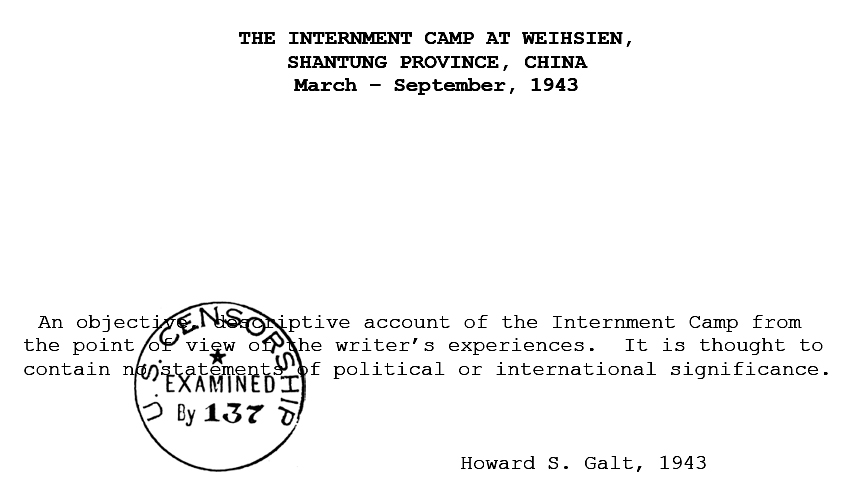
- by Howard S. Galt
[Excerpts] ...
[...]

The Entertainment Committee
After the beginning of camp life, not many
weeks elapsed before a series of weekly entertainments was provided.
These took many forms, dramatics and music programs being the most frequent.
Members of the group coming from Peking – a city always proud of its cultural attainments – were most resourceful in preparing entertainment programs, but the Tientsin group was by no means backward. In many of the entertainments, both dramatic and musical, all three of the city centers furnished talent.
In this connection it is not improper to mention Mr. Curtis Grimes, a young pianist and conductor with a rapidly growing reputation in Peking. His most notable contributions were his own piano concerts, and the leadership of a chorus and an orchestra.
The nucleus of both chorus and orchestra had been trained for longer or shorter periods by Mr. Grimes in Peking. These members were re-enforced by excellent musicians from the other cities.
Among the musical programs of the chorus were three of the great classical oratorios.
In this connection it may be noted that, at the time of the establishment of the camp the Japanese authorities were good enough to give special permission to transport to the camp a grand piano from Peking.
Later a second piano was similarly brought from Tientsin.
The church serving as an auditorium with a seating capacity of 700 or 800, made possible the regular entertainment programs. It was soon noted that if programs could be given twice, the attendance of practically the whole adult membership of the camp was possible.
Friday and Saturday evenings were usually chosen for the two settings, and on Thursday tickets for the two evenings in equal numbers were freely distributed.
Besides the evening entertainment, there was an almost daily series of athletic sports.
The grounds near the hospital, already mentioned, were used for tennis, basketball, and volleyball. An athletic field left of the church was larger and there baseball and hockey were played.
By far the most popular sport was baseball – most popular both for the players and spectators. The size of the grounds cramped the game somewhat so that the softball (or playground ball) was commonly used. For this also the grounds were really too small, so that some special “ground-rules” were necessary, one of the most important being that when the batter knocked the ball over the compound wall he was entitled to a “home-run.”
In the selection and matching of teams, all of the major divisions of camp personnel were recognized.
Each kitchen group had its team, and at times a second team as well as a first. Each of the three cities – Peking, Tientsin, and Tsingtao – had its team. Some of the larger corporations, such as the B.AT. (British American Tobacco Co.) and the Kailan Mining Administration had their teams.
Other teams were selected quite miscellaneously by captains, appointed or self-chosen. There were boys’ teams and girls’ teams. But the team which, after many contests, proved superior to all was a team selected from among the Catholic Fathers. The whole camp was surprised at the proficiency of this team and at the interest both Catholic priests and nuns manifested in the game. One of the Catholic bishops took part in the game. The best player in the whole game was a priest whose nickname was “Father Wendy.”
Although competition was keen, there was the utmost harmony and good feeling.
When the weather was good, there were games almost every evening and spectators gathered in crowds. At some of the keenly contested games probably more than half of the entire camp (often including some of the Japanese guards) was present along the sidelines.
Among entertainments there should be mentioned one organized not by the entertainment committee but by the Catholic Fathers.
It was an outdoor performance held Sunday evenings. Its leading spirit was a Dutch priest of great vigor and vitality, a good musician and possessing marked natural qualities of leadership.
English was the language which was most used, of course, but the Father in charge had very incomplete knowledge of English, and his foreign accent, and the mistakes which he made, which did not at all quell his enthusiasm, were part of the entertainment.
The program, largely improvised and prepared for each occasion, included much music, instrumental and vocal, the latter in the form of community singing. The words of the songs, usually adapted to familiar melodies, often referred to interesting camp happenings, or made “local hits.”
Besides music, with a continual flow of interactions and humorous comments by the leader, there were simple dramatics, puppet shows and shadow pictures.
A small movable stage, with suitable electric lighting, was set up for each occasion. These entertainments seemed to fill a Sunday evening vacancy in camp life and became very popular with an attendance of people, both sitting and standing, of 500 or 600.
It may be added that the Protestant church held Sunday evening song services, but they were by no means as popular as this entertainment by the Catholics.
A very different form of entertainment, the game of chess, while not under the auspices of the Entertainment Committee, was quite popular, promoted and organized by a chess society. The players were classified and a systematic tournament was held.
[further reading] ...http://www.weihsien-paintings.org/DonMenzi/ScrapBook/1943-Galt_Weihsien-1.pdf
#








